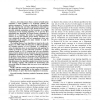Free Online Productivity Tools
i2Speak
i2Symbol
i2OCR
iTex2Img
iWeb2Print
iWeb2Shot
i2Type
iPdf2Split
iPdf2Merge
i2Bopomofo
i2Arabic
i2Style
i2Image
i2PDF
iLatex2Rtf
Sci2ools
113
click to vote
CORR
2010
Springer
2010
Springer
Settling the Polynomial Learnability of Mixtures of Gaussians
Given data drawn from a mixture of multivariate Gaussians, a basic problem is to accurately estimate the mixture parameters. We give an algorithm for this problem that has running time and data requirements polynomial in the dimension and the inverse of the desired accuracy, with provably minimal assumptions on the Gaussians. As a simple consequence of our learning algorithm, we we give the first polynomial time algorithm for proper density estimation for mixtures of k Gaussians that needs no assumptions on the mixture. It was open whether proper density estimation was even statistically possible (with no assumptions) given only polynomially many samples, let alone whether it could be computationally efficient. The building blocks of our algorithm are based on the work (Kalai et al, STOC 2010) [17] that gives an efficient algorithm for learning mixtures of two Gaussians by considering a series of projections down to one dimension, and applying the method of moments to each univariate p...
| Added | 09 Dec 2010 |
| Updated | 09 Dec 2010 |
| Type | Journal |
| Year | 2010 |
| Where | CORR |
| Authors | Ankur Moitra, Gregory Valiant |
Comments (0)

